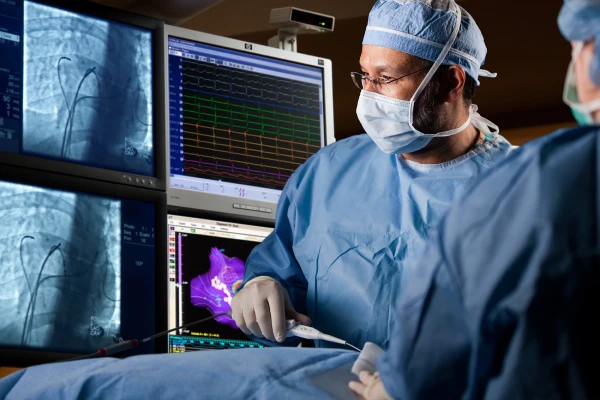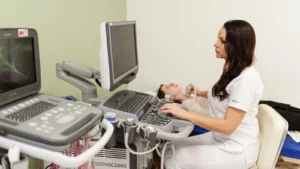
Are You Searching For An ARDMS Practice Exams?
Preparing for the ARDMS exam can be challenging. Finding the right ARDMS practice exams can
Home > What Does Registered Cardiac Sonographer Mean in Medical Terms?

Ever wondered who listens to your heart and reveals those secrets about your heart’s health? We’re talking about registered cardiac sonographers, skilled medical professionals who specialize in ultrasound technology that creates pictures of your heart. Think of it like taking a video of your heart in real-time, but instead of a camera, they use sound waves. So, who are these individuals, what kind of registered cardiac sonographer exam do they have to go through to become experts, and what do they use to prepare themselves for this exam, like RCS exam practice questions? Let’s break it down.
Okay, so what exactly does a registered cardiac sonographer do? Their main job is to perform echocardiograms, which are basically ultrasounds of your heart. But there’s more to it than just pressing buttons and taking pictures.
A good cardiac sonographer is a bit like a detective. Once they’ve passed the registered cardiac sonographer exam, they use their technical skills to take detailed images of your heart, but they also need to understand what they’re seeing. They have to know how your heart should look and function, and they have to spot any abnormalities.
And it’s not just about the pictures. These sonographers talk to you, explain what’s happening, and make sure you’re comfortable throughout the process. It can be a little worrying to have a test done, so their calming presence can make a big difference. Plus, they work closely with cardiologists and other healthcare professionals, sharing information to ensure you get the best possible care.
Now that we know what a registered cardiac sonographer does, the next question is, what exactly does an echocardiogram show? Think of it like a detailed map of your heart – a living, beating map. It reveals the size and shape of your heart, how well the valves are working, and how strong the muscle is pumping. This information is crucial for doctors to diagnose conditions like heart disease, valve problems, or even congenital heart defects.
There are a few different types of echocardiograms. The most common one is a transthoracic echocardiogram (TTE), where the sonographer places the ultrasound probe on your chest. There’s also a transesophageal echocardiogram (TEE), where the probe goes down your throat to get a closer look. Stress echocardiograms are done while you exercise, and Doppler echocardiography measures blood flow.
Now, you might think that these tests aren’t painful, but they’re not. You might feel a bit of pressure, but that’s it. Before the test, you might have to avoid eating or drinking for a few hours, but your doctor will give you specific instructions.
If you’re interested in a career as a registered cardiac sonographer, it’s a rewarding field, but it does require dedication and hard work. First, you’ll need a solid foundation in science and healthcare. Most sonographers have an associate or bachelor’s degree in sonography or a related field. This is where you’ll learn the theory behind ultrasound technology and the anatomy and physiology of the heart. Once you have this knowledge, you can take the Registered Cardiac Sonographer Exam.
But book knowledge about the Registered Cardiac Sonographer Exam isn’t enough – you’ll also need hands-on experience. Clinical training is a crucial part of any sonography program. You’ll get to work with real patients under the supervision of experienced sonographers, putting your book knowledge into practice.
And then comes the big Registered Cardiac Sonographer Exam – literally! To become a registered cardiac sonographer, you need to pass the Registered Cardiac Sonographer Exam. There are two main options: the RDCS (Registered Diagnostic Cardiac Sonographer) exam offered by ARDMS or the RCS (Registered Cardiac Sonographer) exam offered by CCI. Each Registered Cardiac Sonographer Exam tests your knowledge and skills, and passing one is essential to show you’re qualified and competent.
Okay, so you’re interested in getting certified, but there are two types of exams you’ve heard about – RDCS and RCS. Both the RDCS and RCS certifications are like a seal of approval, showing that you’ve got the knowledge and skills to be a top-notch cardiac sonographer. However, there are some key differences between RDCS and RCS.
The RDCS (Registered Diagnostic Cardiac Sonographer) exam is offered by ARDMS (American Registry for Diagnostic Medical Sonography). The RCS (Registered Cardiac Sonographer) is offered by CCI (Cardiovascular Credentialing International). Both RDCS and RCS exams are tough, but they test different things. The RDCS focuses more on the technical aspects of echocardiography, while the RCS puts a bit more focus on the interpretation of images.
Which one is right for you between RDCS and RCS? Well, it depends on a few things. First, you’ll need to meet specific eligibility requirements for each exam, so check those out. Second, think about your career goals. Some employers might prefer one certification over the other, depending on their specific needs. But don’t stress too much – both RDCS and RCS certifications will open doors for you in this exciting field.
So, there you have it – all the information you need about registered cardiac sonographers, the registered cardiac sonographer exam, and the differences between the RDCS and RCS certifications. These skilled professionals are the ones who listen to your heart and figure out what’s wrong with it. Their dedication and technical skills contribute to accurate diagnoses, effective treatment plans, and, ultimately, healthier lives. If you are passionate about becoming a registered cardiac sonographer, you need to focus on the registered cardiac sonographer exam, and that’s where Ocean Ultrasound comes in. We provide top-notch, comprehensive study materials like practice questions, webinars, and more so you can succeed in your exam and get the coveted certification. So, if you’re ready to dive into a fulfilling career where you make a real difference, call Ocean Ultrasound TODAY!

Preparing for the ARDMS exam can be challenging. Finding the right ARDMS practice exams can

Preparing for the Echo Board Exam can be challenging. A good Echo Board Exam Review

Understanding the Pediatric Echo test is essential for parents and caregivers. This test, also known

So, you’re seriously thinking about taking the echocardiography certification exam? You have to know that
Subscribe our newsletter to get our latest update.
Copyright © 2024 | Ocean Ultrasound